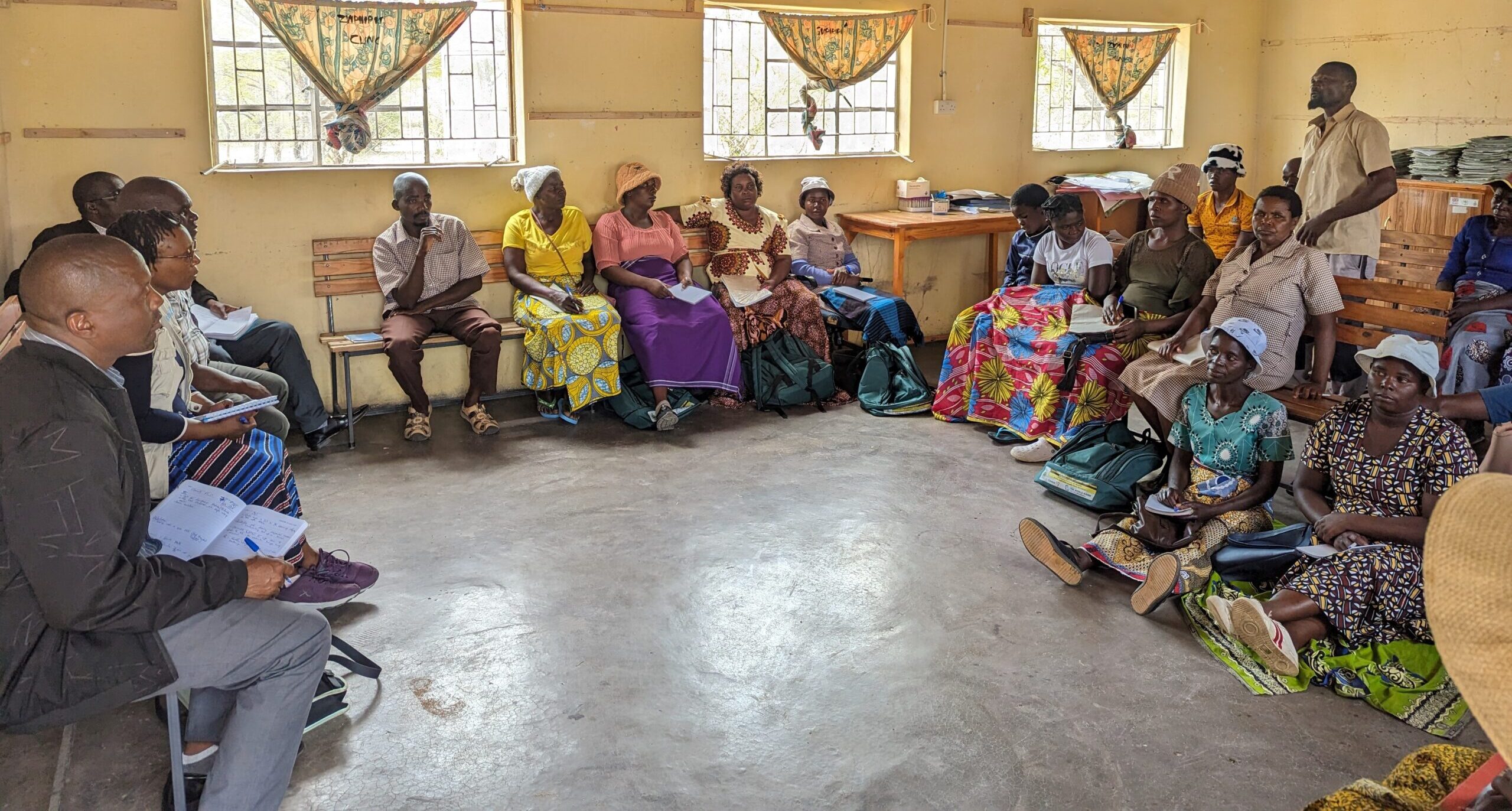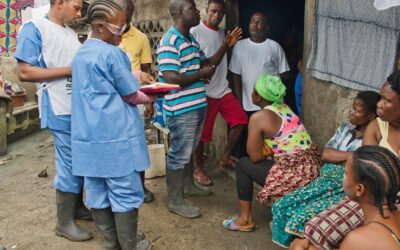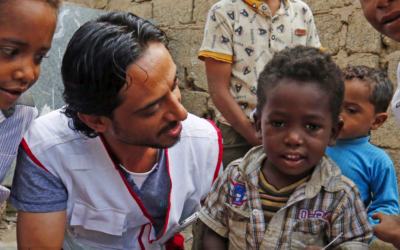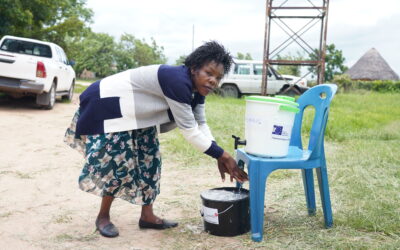An alarming upsurge in the cholera outbreak in Zimbabwe occurred over the festive season with transmissions continuing to climb due to the annual rainy season. In total, 19,915 and 370 suspected deaths (CFR: 1.86%) have been reported from 60 districts, in all 10 provinces from February 2023 to 22 January (13,230 cases from Nov 2023). WHO and UNICEF project an estimated 38,763 cases by February 2024 (20,000 more cases within one month). The provinces with the highest number of new cases are Harare, Manicaland, and Masvingo. In total, 2.7 million people are at risk of contracting cholera in Zimbabwe.1
An immunisation campaign will be led by the Government with support from UNICEF/WHO. The OCV campaign targets 2.2 million. According to UNICEF, “factors driving cholera transmission include low access to safe water, inappropriate sanitation and IPC, health system challenges (staff attrition, capacity, access, and quality issues), unsafe burial practices, waning immunity from the 2019 OCV campaign, and multiple disease outbreaks (polio, measles)2.” Cross-border population movements with neighbouring countries, including Zambia, Malawi, and Mozambique, present continued risks for increased transmissions.
LAST QUARTER MAIN ACTIVITIES
Per the request of the Ministry of Health (MoH), Collective Service (CS) partners conducted focus group discussions in communities and rapid qualitative assessments (RQAs) to gather and share insights from Kuwadzana, Glenview, Mutare Rural, and Gutu districts. The UK Public Health Rapid Support Team (UK-PHRST), an innovative partnership between the UK Health Security Agency and the London School of Hygiene & Tropical Medicine, provided critical staff support in RCCE coordination with an RCCE Specialist seconded to UNICEF, to undertake this work. This was followed by the CS Surge Coordinator, from the IFRC, who developed a national community feedback mechanism in coordination with MoH and partners. Based on the qualitative data gathered by UNICEF, actionable recommendations across response pillars on challenges communities are having regarding access to clean drinking water, poor health-seeking behaviours, and poor sanitation facilities, for example. Partners continue to use this data to inform their response.
1. Strengthening the activation and implementation of a national and sub-national RCCE coordination mechanism for the cholera outbreak
- The partners, supported by the RCCE CS Information Management Specialist, developed a 4Ws dashboard for the RCCE pillar to outline the locations where existing partners were working and the activities they were implementing.
- The team also crafted an RCCE strategy for UNICEF’s cholera response plan, which is currently under review by the Ministry of Health (MoH).
- The partners proposed a new agenda for pillar meetings, and it was accepted by the MoH to promote a more dynamic approach to coordination with partners, ensuring that community feedback and social analytics drive priorities and key actions.
- The team created a set of rapid qualitative Focus Group Discussion (FGD) and Key Informant Interview (KII) topic guides, adapted from guides used by the RCCE CS during the cholera outbreak in Malawi and refined by the UK-PHRST’s Social Science lead. These guides were shared and utilised by RCCE pillar partners to encourage the standardisation of data collection tools, facilitating data sharing and use among different agencies.
2. Building national and sub-national RCCE capacity to deliver high quality activities
- The partners focused on providing capacity strengthening support to RCCE and WASH partners in collecting, analysing, and acting on qualitative community feedback data, particularly in coding data.
- With the support of the RCCE CS IM and Surge Support Coordinator, several training sessions were conducted on feedback mechanism setup/management and qualitative feedback data coding. A national-level data coding framework was developed, covering COVID-19, cholera, measles, and polio, allowing for the analysis of data across different outbreak responses.
- Additionally, an inter-agency community feedback dashboard has been established, and three partners are currently collecting, coding, and sharing their data for discussions and actions in the next steps.
- A joint workshop with WHO for multi-faith leaders through the Zimbabwe Council of Churches focused on cholera prevention and control. This included a participatory action planning session where leaders were asked to identify key transmission risks in their communities and propose ideas on how they could support their communities in mitigating these risks.
- A co-facilitated 5-day Infodemic Management/Community Feedback training, in collaboration with provincial MoH leads for all 10 of Zimbabwe’s provinces alongside WHO and the CS, was successfully conducted. The outcome of the session was the development of clear Standard Operating Procedures (SOPs) and agreements on roles and responsibilities for operationalizing a government-led community feedback mechanism for outbreaks in Zimbabwe.
3. Generating evidence and insights into community perspectives on transmission dynamics to inform adaptive decision-making within the response
- The team conducted rapid qualitative assessments in both rural and urban settings to comprehend transmission dynamics and offer recommendations to the pillars. This included:
- A rapid qualitative assessment (RQA) in Manicaland (rural context)
- A thematic snapshot on community perceptions of Oral Rehydration Points (ORPs) and Oral Rehydration Salts (ORS) to inform the case management pillar’s community-based ORP strategy.
- Through UNICEF, a U-Report poll was initiated: the survey collected over 900 responses from adolescents and young adults across the country regarding their practices and perceptions of cholera.
KEY ACHIEVEMENTS
Over the last few months, this joint effort and partners collaboration have strengthened the integration of community insights into the response by improving the quality and standardisation of data collection tools, enhancing the capacity of implementing partners, and refining the strategic focus of the RCCE pillar’s workplan.
NEXT STEPS – 2024 Q1
The MoH has requested that the CS Surge Coordinator return to Zimbabwe to coordinate the sub-national activation and rollout of the CFM, including data coding training, and onboarding of partners, which will be prioritised over the next 3 months to ensure the systematic collection of community feedback. The community feedback dashboard is now live and data is being uploaded. A rapid qualitative assessment is being planned to gather in-depth insights on attitudes and perceptions towards OCV ahead of the vaccination campaign.
Here are a few pictures from the Social Sciences activities conducted in Manicaland Province – ©Sophie Everest
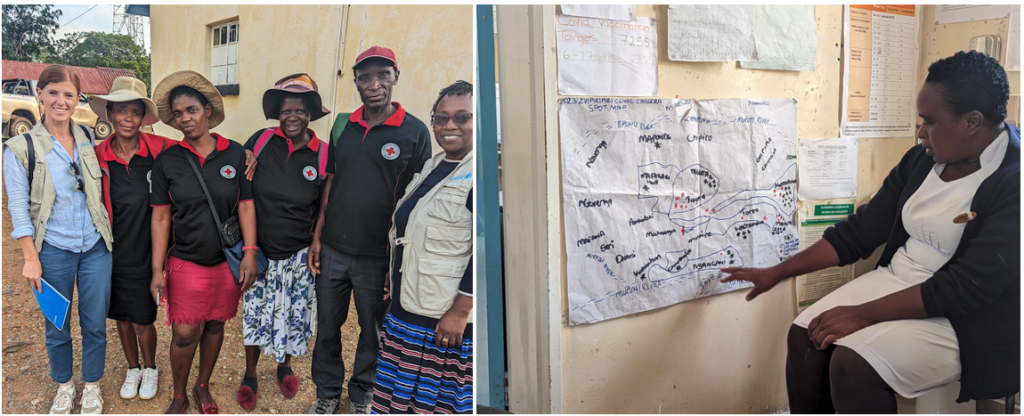
The Unicef and Zimbabwe Red Cross Society partners, and a CTC nurse presenting cholera hotspot map
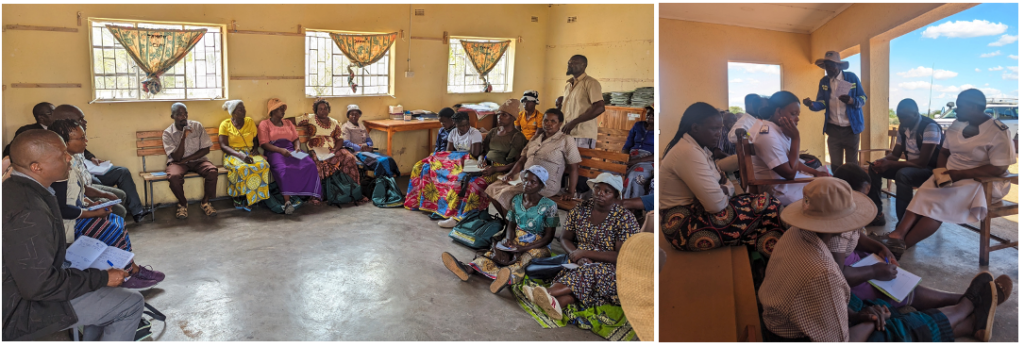
(Left) A community FDG in Mutare Rural, and (right) a Leaders and VHWs group discussion in Buhare, Manicaland Province
About the UK-PHRST
The UK-Public Health Rapid Support Team is a key international partner in epidemic disease response. We partner with low- and-middle income countries to respond to infectious disease outbreaks before they develop into global health emergencies. We work closely with international organisations, partner country governments and non-governmental organisations to:
- Rapidly investigate and respond to disease outbreaks at their source in LMICs eligible for UK Official Development Assistance, with the aim of stopping a public health threat from becoming a broader health emergency.
- Conduct research to generate an evidence base for best practice in epidemic preparedness and response.
- Strengthen capacity for improved national response to disease outbreaks in LMICs.
The views expressed in this publication are those of the author and not necessarily those of the Department of Health and Social Care.
- Ministry of Health and Child Care Zimbabwe, Cholera Situation Report, 22 January 2024 ↩︎
- UNICEF Situation Report, 05 January 2024 ↩︎

